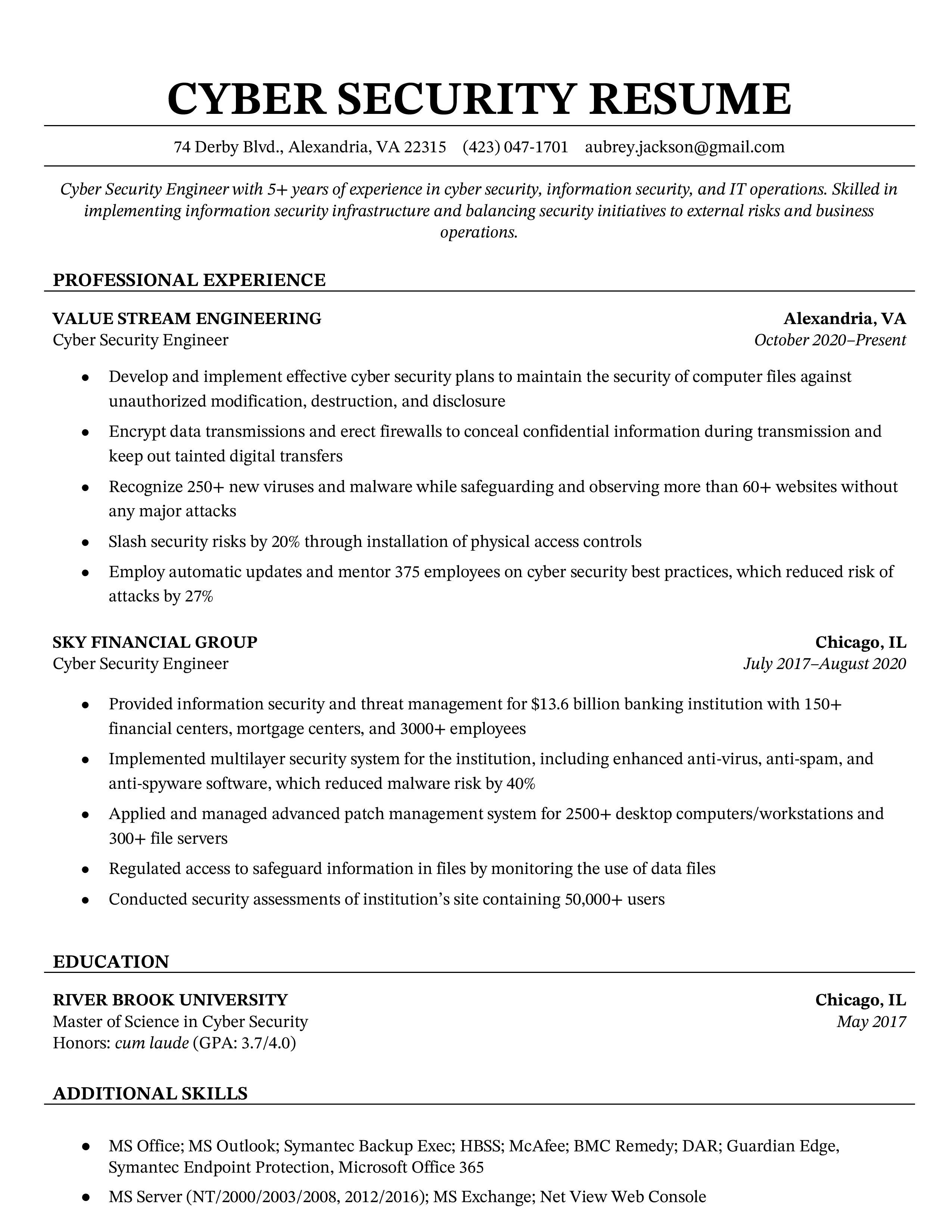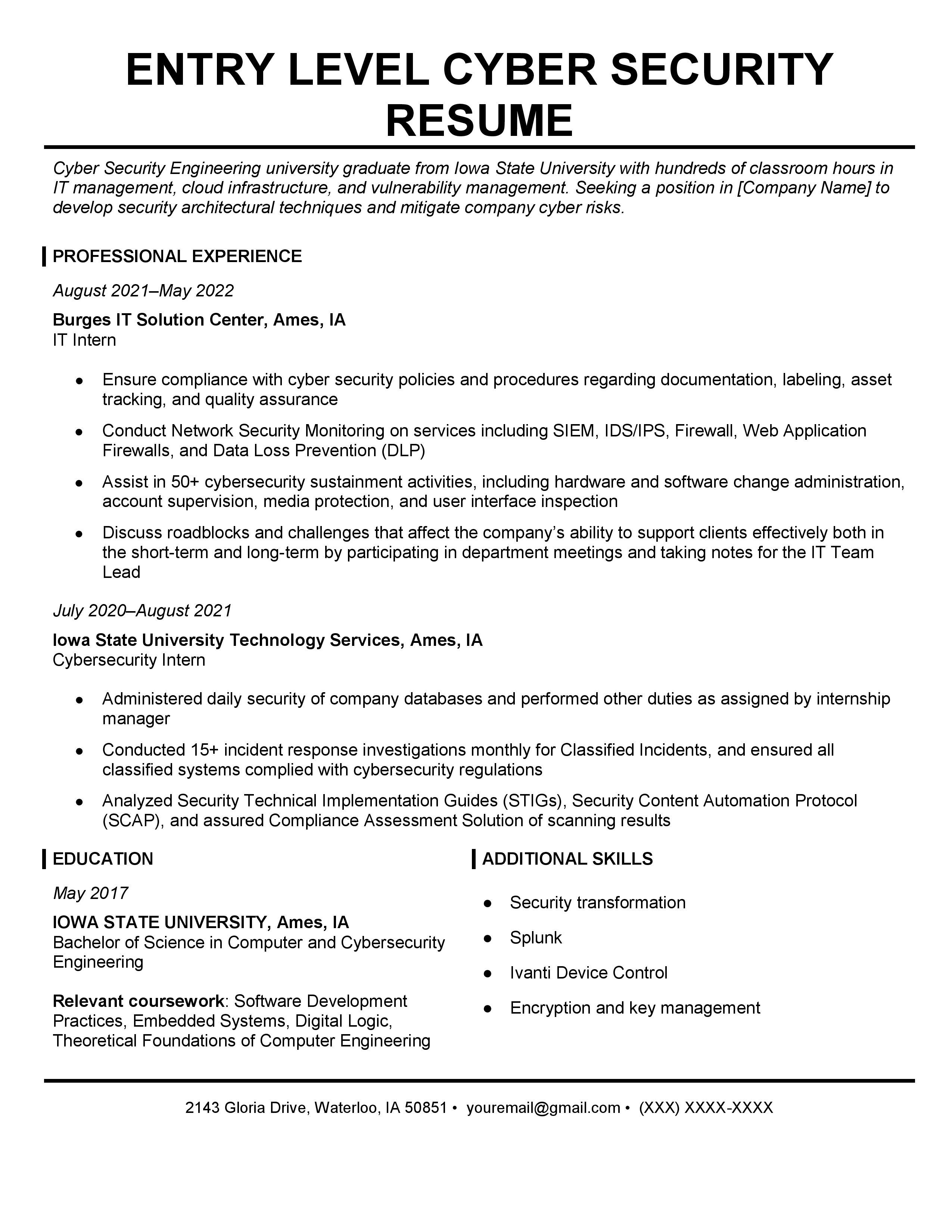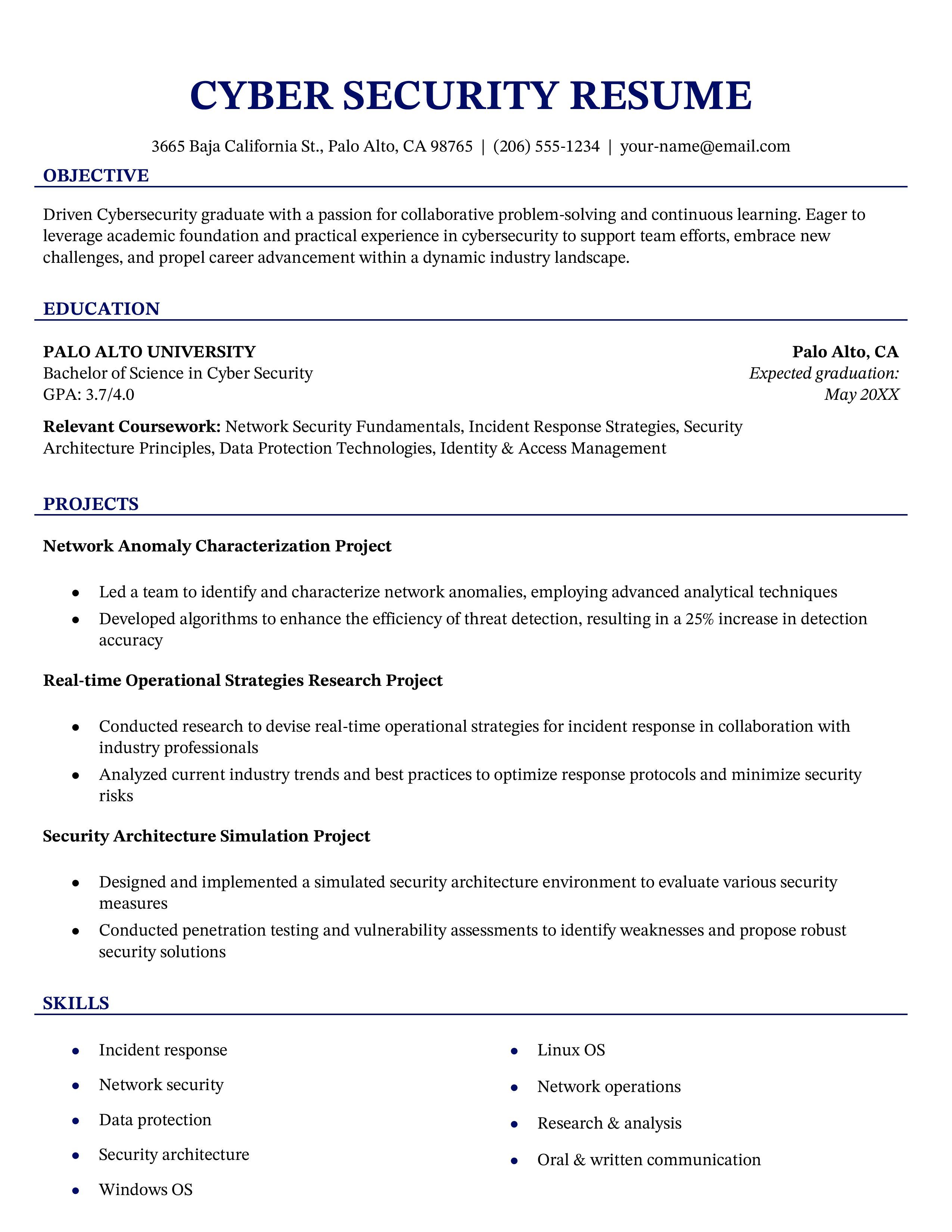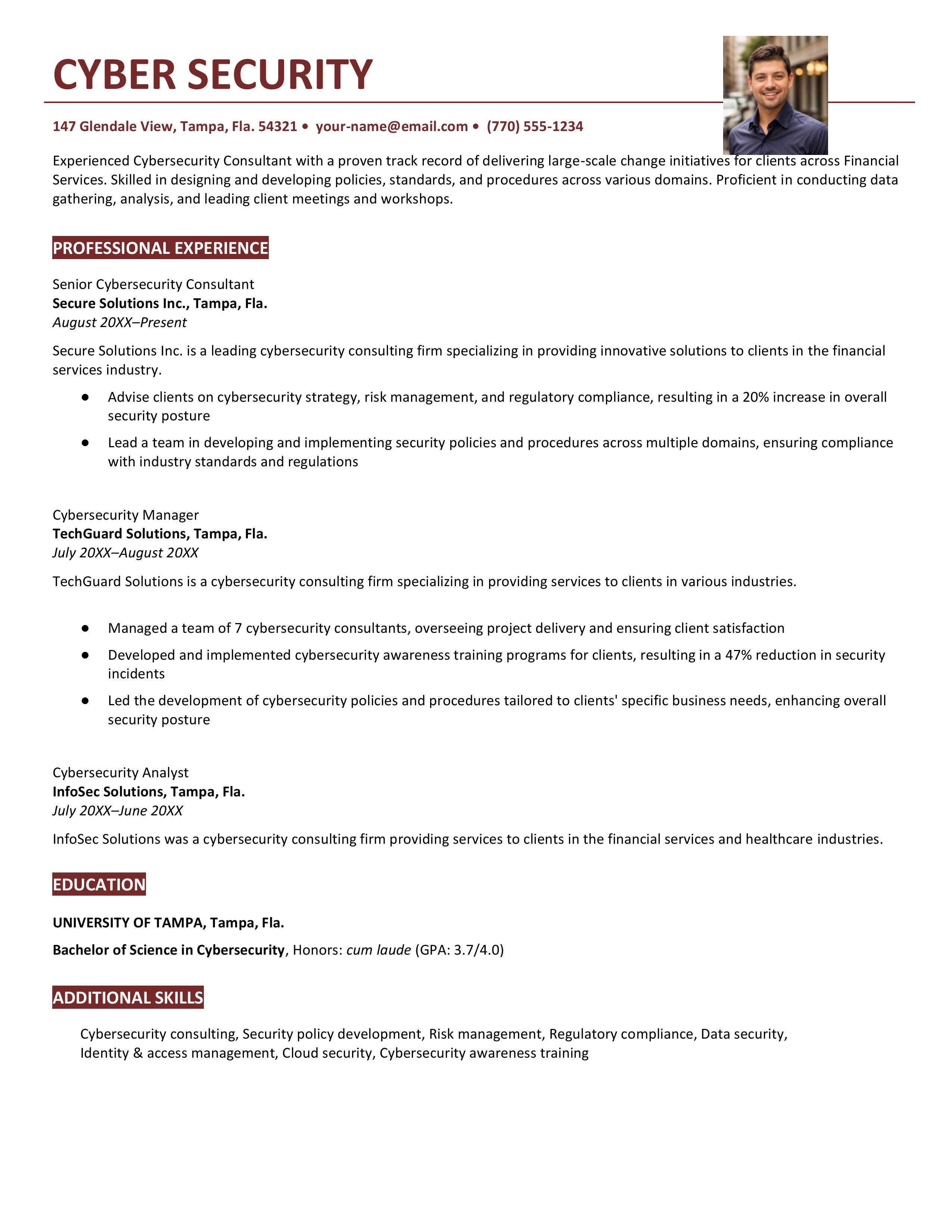Cybersecurity Resume: Expert Tips & Sample for Success
Published on September 30th, 2024
In this era of digital technology, security has been a forefront point for protection against sensitive information as well as malicious attacks. Owing to the growing need for proficient professionals in this field, it is indispensable to have a well-crafted resume that would stand a superior cut in the market. Whether it's a seasoned cybersecurity professional or one who is just starting, this resume is your chance to showcase your skills, experience, and value to any potential employer.
Here are some of the key elements that outline a cybersecurity resume that will portray you as the ideal candidate for some of those cybersecurity jobs.
Role of Cybersecurity
The term generally refers to protecting systems, networks, and programs from various forms of digital attacks. Most attacks are focused on gaining unauthorized access or modifying information for personal use; extorting money from users; or interfering with normal business operations. Effective implementation of cybersecurity measures has, however, been challenging since attackers are innovative and devise sophisticated methods of attack.
Why Do You Need A Good Cybersecurity Resume?
A highly specialized field requiring technical knowledge, effective problem-solving skills, and the agility to respond to evolving threats, cybersecurity is the area most in demand by employers. That would require a candidate who would not only be strong in technology but someone seasoned and able to manage risk, ensure compliance with industry regulations, and guard critical data.
With all these cybersecurity positions security analysts to penetration testers, incident responders to CISOs-the respective resume will vary based on the position you seek. A well-written resume can help prove experience, passion, and capability to respond to complex security challenges.
Check out the free templates for cybersecurity resume
Template 1
Template 2
Template 3
Template 4
Important Elements of a Cybersecurity Resume
A cybersecurity resume has a templates that points out your qualifications and experience about the job. Here are the sections you must provide.
1. Contact Information
The resume has its head with your full name, phone number, email, and LinkedIn profile if available. Ensure this information is readily available and formatted neatly at the top of the page.
2. Professional Summary
A professional summary, also known as an objective statement, is a concise overview of your qualifications, experience, and sometimes even career aspirations. This is the section you would want to make shine your cybersecurity skills and be specific to the position you are applying for.
Example
Detail-oriented cyber security professional with over seven years of experience in network security, incident response, and vulnerability assessment. Demonstrated the ability to create and implement solid security frameworks that would protect critical systems and information through robust practices. Seeking industry leverage through a lead security position with an innovative company.
3. Key Strengths
Cybersecurity involves both technical and soft skills, specifically problem-solving, communication, and critical thinking. Craft a skills section that appears to be a combination of both. The following are on the list:
Technical Skills:
- Network security
- Penetration testing
- Vulnerability assessments
- Intrusion detection/prevention systems (IDS/IPS)
- Security Information and Event Management (SIEM)
- Encryption technologies
- Incident response
- Firewalls and VPNs
- Risk assessment
- Malware analysis
- Compliance with security frameworks (e.g., NIST, ISO, GDPR)
Soft Skills:
- Analytical thinking
- Problem-solving
- Communication
- Attention to detail
- Collaboration
- Adaptability
Certifications and Licenses
In this profession, certifications are important because they reflect the technical skills and the knowledge of the professional on par with the requirements of the industry. Make sure that you include all your certifications clearly, and if it is possible, provide a separate heading for the same.
Some popular cybersecurity certifications are:
- Certified Information Systems Security Professional (CISSP)
- Certified Ethical Hacker (CEH)
- CompTIA Security +
- Certified Information Security Manager (CISM)
- Certified Information Systems Auditor (CISA)
- Offensive Security Certified Professional (OSCP)
- GIAC Security Essentials (GSEC)
Certifications:
CISSP - Certified Information Systems Security Professional - 2021
CEH (Certified Ethical Hacker) – 2020
CompTIA Security+ – 2018
5. Professional Experience
Most of your cybersecurity resume should be built on your professional experience. Employers are interested in knowing not only where you have worked but also what you have accomplished and how your work has positively impacted the organizations you have been part of. Your professional experience should be in reverse chronological order and target roles relevant to cybersecurity.
For each position, include:
Job Title: Post you were working for the organization.
Company Name: The organization you were working for
Location: City and state of where the company was.
Dates of Employment: Time you served in that position
Key Responsibilities and Achievements: Explain this in bullet form, where you have your responsibilities and accomplishments, and include the numerical wherever possible by adding a statistic, percentage, or number; which will give an impression of impact.
Here is an illustration below
Cybersecurity Analyst, ABC Tech Solutions
July 2019-Present, Austin, TX
- Led to the identification and mitigation of network vulnerabilities. This caused a drop in security incidents by 30% over 12 months.
- Penetration testing on schedule carried out vulnerability assessments to guarantee security for enterprise systems.
- Organized collaboration with the IT team at the structural level to enhance security protocols that improved the overall security posture while complying with GDPR and HIPAA.
- Maintained real-time security alerts with SIEM tools and responded and neutralized any critical threat within 10 minutes of detection.
6. Education
Insert education in reverse chronological sequence, commencing from the highest degree acquired. If you are in some specialized courses in cyber security, be sure to include them in this section.
Example:
Bachelor of Science in Computer Science
University of Texas, Austin, TX
Graduation Date: May 2017
Cybersecurity Bootcamp, Cyber Defense Academy
Date completed: June 2020
Optional Sections
Other sections that you might consider listing depending on your experience and the job you're applying for are:
Projects: You would want to list significant cybersecurity projects you led or were involved with, like the development of a security framework for an organization, leading penetration testing efforts, or implementing an audit for compliance.
Publications or Speaking Engagements: If you have published papers or articles on cyber security topics, or even presented at industry-specific conferences then list them here to prove that you are a thought leader.
Awards and Honors: Include any award or recognition you have received for outstanding cybersecurity work.
How to Write a Great Cyber Security Resume
Tailor your resume to the job description: Tailor your resume to every job by using keywords in the job listing. You'll also ensure that, if nothing else does, your resume will pass through the Applicant Tracking Systems to scan for specific terms.
Focus on your achievements: Employers hate giving. Use concrete examples and quantify your achievements to demonstrate that you have made an impact through your previous roles.
Keep It Short and Sweet: An ideal cybersecurity resume is one page long for entry- to mid-level professionals. For experience ten-fifteen years or, a two-page resume is acceptable.
Action Verbs: Use words like "led", "developed", "implemented", or "monitored" at the start of each bullet to give it a sense of responsibility and ownership of what was accomplished.
Focus on Security Tools and Technologies: All the security tools and technologies that you have worked on your resume will come into focus, such as firewalls, SIEM tools, encryption protocols, etc.
Proofread: Since the field of cybersecurity is highly detail-oriented, so must your resume. Proofread at least three times to avoid typos and errors.
Conclusion
With the increasing speed of evolution and demand in cybersecurity, your resume has become the ticket to what you want. It is through customising your resume to focus on your relevant experience, credentials, skills, and achievements that you could, therefore, develop a compelling document which captures the attention of probable employers and proves its worth to them.
Follow these suggestions presented in this blog to write a resume that positions you as a cybersecurity professional ready to take on the industry's toughest challenges. Good luck!
Authors

Yash Chaudhari
With a strong background as an SEO and Content Specialist, Yash excels in driving organic traffic, improving search engine rankings, and creating SEO-optimized content. He has a proven track record of implementing strategies that increase website traffic and conversions. Additionally, Yash is an automotive enthusiast and has a keen interest in astronomy.
Hire the best without stress
Ask us how
Never Miss The Updates
We cover all recruitment, talent analytics, L&D, DEI, pre-employment, candidate screening, and hiring tools. Join our force & subscribe now!
Stay On Top Of Everything In HR





